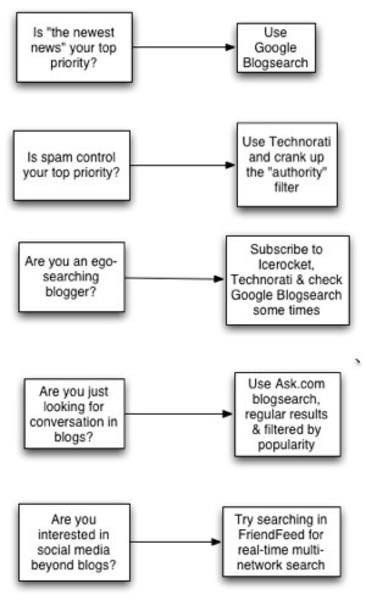What blog search engine should you use? That depends on your needs.

In order to join a conversation, you’ve got to be able to find it first. Three years ago “blog search” was expected to be a booming industry, startups left and right developed different technologies and more than a few raised millions of dollars to help users search the part of the web made up of blogs. These days no one thinks consumer-market blog search is a serious business, but many of us still have a need to limit searches to blogs. What should we do? ReadWriteWeb offers some recommendations and an assessment of the state of the industry below.
Choosing a Blog Search Engine
Different circumstances call for different search engines. We’ve made a chart below illustrating our different recommendations to fill different needs. When, for example, we’re looking to see if anyone else has written about a breaking news story yet – we use Google Blogsearch because it’s the fastest. When we’re putting a live search feed on a public web page, though, we use Technorati and crank up the spam-control it offers. Many businesses use profesional blog tracking services for some of their search needs, but we’re not convinced those services are as useful as grabbing some of these worn old tools and doing it yourself.

Where These Services Stand Today
Technorati is the old stand-by, the blog search engine that the smartest blog lovers used to use. These days it’s a sad shadow of what it used to be. The company leadership is focused on building an advertising network and search features have been shed like there’s no tomorrow. The company’s developers say that features will be returning, just in a more accessible form, but we’re not holding our breath.

The service is slow, misses a lot of search results (perhaps in the name of spam prevention) and is so loaded down with cruft and extraneous page loads that it makes us want to scream.
That said, the fundamental value proposition of Technorati remains – it counts inbound links to every blog it has indexed and it will let you sort by that metric of “authority.” More advanced RSS-heads will appreciate the fact that Technorati delivers “authority” numbers in its RSS feeds and those numbers can be used to fine tune spam filtering in Yahoo Pipes.
Google Blogsearch is the fastest in the industry but has gone almost untouched since the day it launched, except for a recent dabble with memetracking on the front page. Google Blogsearch spam control is not good and recently the search engine started bringing back search results from places like blog sidebars. It thinks that content is new, too, every time a new blog post (the content we really care about) is published. It’s painful to look at Google Blogsearch results pages, but if you’ve got a need for speed or want to make use of the relative heft of the Google search input box for things like complex queries – then it’s a good option.

IceRocket is Mark Cuban’s baby and has improved more in recent years than anyone else on this list. It’s quite a sophisticated tool for searching blogs. It’s got trend analysis, author awareness and a number of other cool features. Unfortunately it only lets you organize search results by data and sometimes other needs arise.

IceRocket also misses some search results that even Technorati catches, though it catches some that Technorati misses as well.
Ask.com Blogsearch has become an unexpected favorite of ours over the years. It’s nice. Spam control is pretty good, speed is pretty good, the size of the index is pretty good. It’s a pretty good blog search engine. The best thing about it is that it’s very easy to sort results by relevance, date or “popularity” of the source, as defined by the number of subscribers the source feed has in Ask’s formerly market dominant feed reader Bloglines. Want to find out who the biggest blogs are that have written about Chihuahuas lately? (We’ll just tell you, it’s Jalopnik, Celebrity Baby Blog and Fark.)

If there’s a downside here, it’s that Ask does index a fair number of feeds that aren’t really blogs. And it doesn’t do anything else that’s particularly fabulous. None the less, we find ourselves going back to it every day.
FriendFeed is a lot of things, but it’s also a blog search engine of sorts. It’s a cross-network, real time social site originally built by a team of ex-Google employees. It’s pretty awesome and once you’ve got an account there you can search blog posts, Twitter messages, YouTube videos, SlideShare powerpoint presentations and much more. The down side is of course, it only lets you search the content that other users have synced with their FriendFeed account. That content has a whole lot of conversation going on around it though! Several members of the ReadWriteWeb team use the newly launched FriendDeck to do real-time tracking of FriendFeed. You can meet our whole team on FriendFeed here or join us in the RWW room (open to anyone) here.

That’s How We See it – What’s Blog Search Like for You These Days?
We’d love to hear about your favorite blog search tools these days. What do you use and in what circumstances do you use it? Is blog search itself old news in a new era of real-time microblogging? We welcome other perspectives on this field that may have lost some of its luster but remains useful and important several years after it was so hyped.










